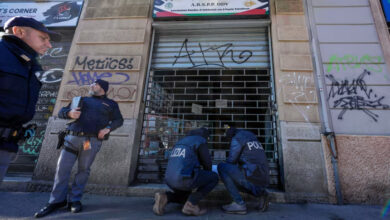Italian Foreign Minister Franco Frattini on 27 February announced the suspension of the bilateral friendship treaty with Libya, a co-operation agreement signed in 2008 by leader of Libya President Muammar Qadhafi and Italian Prime Minister Silvio Berlusconi.
“We have reached, I believe, a point of no return,” Frattini commented on Italia Sky television, prospecting the inevitable end of Qadhafi’s tenure as head of state.
The accord is the result of lengthy co-operation between Italy and Libya, which persisted even through the years of Libya's alleged sponsorship of international terrorism, a charge that fueled the imposition of sanctions on the North African nation by the UN and European Union.
The three-year-old agreement relates mainly to bilateral relations and migration issues. It also established the payment of US$5 billion to Libya as compensation for Italy’s colonial rule in the 1930s, and included a Libyan pledge to help reduce the flow of immigrants destined for Italy from its shores.
The treaty also stipulates each country refrain from hostile acts against the other and decline the use of each respective territory by others (state or non-state actors) for the perpetration of such acts.
If Libya acts outside the international law, however, Italy is obliged by its NATO membership to assist in NATO operations, automatically suspending any obligation towards Libya.
“I believe the suspension of the friendship treaty has a symbolical and political meaning rather than being the signal of a military intervention by international forces against Libya.” said Silvia Colombo, junior researcher on Mediterranean and Middle East countries at the Institute of International Affairs (IAI).
In light of recent developments in Libya, particularly the human rights tragedies incurred by Libyan revolutionaries, this political meaning is of vital importance.
“The substantial violation of human rights by Libya, which has been established by the 1970 (2011) resolution of the Security Council of the United Nations, could be one of the reasons for the suspension of the friendship treaty,” Natalino Rozitti, professor of International Law at the Faculty of Law of the Luiss University in Rome and Scientific Council at the IAI, told Al-Masry Al-Youm.
The expert of international law claimed the suspension does not have to be interpreted as preparation for possible military intervention against Libya. The obligation for both countries to disallow their territory for hostile activities against the other state is, in fact, automatically suspended if the UN Security Council calls for a no-fly zone over Libya or humanitarian intervention.
This is “because the resolutions prevail over any other international obligation, as specified in the treaty of friendship between Italy and Libya,” according to Rozitti.
With regards to future relations between the two states, Nicolò Sartori, an analyst who specializes in energy policy at Rome’s IAI, believes any future Libyan government should consider the importance of the development and capitalization of the country's natural resources.
“Ninety-five percent of Libyan export revenues are related to oil and gas sector, while the 75/80 percent of the national budget depends on energy revenues,” Sartori explained.
Sartori stressed ENI, Italy’s oil and gas major exporter in Libya since 1959, “does not only provide technology skills that are essential to the development of the energy industry in Libya, but it also represents the only market outlet for the Northern Africa country concerning natural gas thanks to the Greenstream pipeline; therefore, there is no reason to void the friendship agreement.”
Ahmed al-Gasir, Libyan human rights activist and researcher currently residing in Switzerland, expressed his concerns about the co-operation between the two countries mainly because of the way illegal migration has been managed under the friendship treaty.
“The policy of controlling the flow merely through police was wrong," he claimed. "On the contrary, European countries should solve the real causes of migration, such as the extreme poverty and the state of instability in the Sub-Saharan area.”
According to Gasir, the money Italy granted Libya for infrastructure development was a positive gesture, but it was not enough to eliminate the causes of migration.
“Most of the money vanished due to the incredible corruption,” the human rights activist commented. “Regardless of the past, there is a great deal of benefit and potentials between Italy and Libya because there are many mutual interests for both countries. I am sure in the future there will be much more co-operation between Europe and Libya, and Italy in particular, but only if Libya has real stability.”




